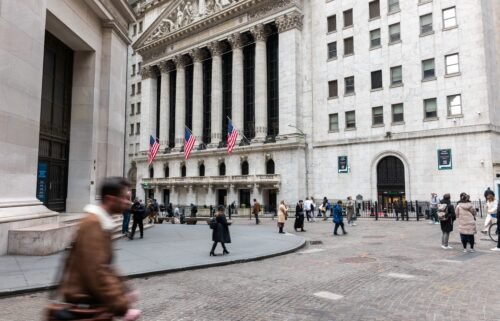Why credit card late fees may drop to $8

Credit cards can quickly go from being convenient to costly if you don’t pay what you owe on time.
By Jeanne Sahadi, CNN
New York (CNN) — Credit cards can quickly go from being convenient to costly if you don’t pay what you owe on time.
On top of the record-high interest rates you’re already subject to, which quickly increase the original balance you owe, you could be hit with late fees if you don’t at least make the minimum required payment by the due date.
But if a proposed rule by the Consumer Financial Protection Bureau is finalized — which many expect could happen later this year — those late fees could be slashed.
The CFPB, which has regulatory authority over various financial products, including credit cards, published its original proposal in February.
It is now reviewing the roughly 57,000 public comments it has received to assess what, if any changes, should be made to its proposal before finalizing the rule, said Brian Shearer, senior adviser to CFPB Director Rohit Chopra.
How things might change
If no substantive changes are made to the proposal, here is how late fees would change, relative to current rules.
Generally speaking, issuers are allowed to charge you a late fee that it deems “reasonable and proportional” to the payment due. Today, they may charge you automatically up to $41 ($30 for your first late payment but $41 for subsequent ones). But they may be allowed to charge you more — up to 100% of your minimum required payment — if they can justify that their costs exceed the $41 late fee.
By contrast, the CFPB proposes slashing the automatic late fee to just $8 per violation. And if an issuer determines its costs for handling late payments exceeds $8, the CFPB rule would let the issuer charge you a higher fee — but no more than 25% of your minimum required payment, Shearer explained.
So, for example, under today’s rules, if your minimum required payment is $100, you could be charged up to $41 automatically or up to $100 if the issuer can justify to regulators its costs to collect exceed $41. But under the CFPB proposal, you either would be assessed an automatic $8 penalty — but no more than $25.
If your minimum were $500, under today’s rules your late fee in theory could go as high as $500 (100% of the minimum due) versus no more than $125 under the CFPB’s proposal.
But since the CFPB hasn’t seen today’s late fees exceed $41, it is unlikely you would see late fees as high as those examples suggest, Shearer noted.
The agency’s proposed rule would also prohibit issuers from adjusting their late fees for inflation. And the CFPB said it may also consider whether consumers should get a 15-day “courtesy period” after the original due date — meaning you wouldn’t be hit with a late fee until you’re at least 15 days late.
The CFPB estimates that its proposed changes could potentially save consumers up to $9 billion a year from the $12 billion in late fees that the agency says credit card issuers collected in 2020.
Shearer noted that the CFPB’s preliminary estimates suggest that what the largest card issuers have been charging in late fees is five times greater than the related collection costs they incur.
The banking industry opposes the proposed rules
Of the 57,000 comments the CFPB has received, 56,000 have been largely positive, Shearer said.
But those from the banking industry’s biggest trade associations are not among them.
In a 39-page joint letter, the American Bankers Association, the Consumer Bankers Association and the National Association of Federally Insured Credit Unions issued several objections to the CFPB’s proposed rule.
Among them, they assert that the CFPB’s estimates don’t account for the costs associated with uncollected late fees or the forgiveness of late fees by financial institutions.
As one industry source put it, “accounts that are paid late are less likely to remain current in the future and become more likely to [be written off as a loss on the issuer’s books], dramatically reducing the likelihood that the bank will ever collect the late fee or the balance owed.”
Their comment letter cites an ABA analysis that found the average delinquent incident (which typically means an account is more than 60 days past due) costs issuers $46.30, including $33 in direct expenses, $9 in attributable expenses and $4.30 in funding costs.
Their letter further asserts that if late fees are subject to the CFPB’s original proposed cap that the deterrence effect of a late fee to encourage people to pay on time will be muted and that all card holders will end up paying a price. “Without an effective incentive to pay on time, late payments and associated costs will increase. As a result, the cost of credit will increase, credit availability will drop, and rewards and other credit card features will decline and some may disappear,” the letter stated.
The proposal, they asserted, “gives short-term preferential treatment to a small minority of frequently late paying consumers at the expense of the vast majority of consumers who pay their bills on time.”
CFPB’s Shearer couldn’t say yet what, if any, changes may be made to the original proposal. But, he said, “We’re taking critiques of our calculations and thinking about whether adjustments need to be made. … We are taking those comments very seriously.”
The-CNN-Wire
™ & © 2023 Cable News Network, Inc., a Warner Bros. Discovery Company. All rights reserved.



